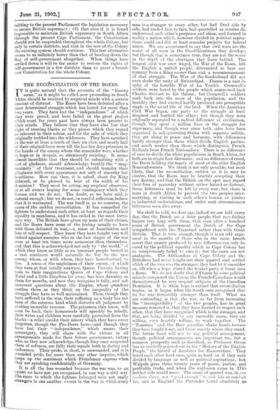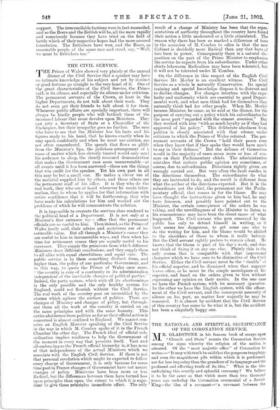THE RECONCILIATION OF THE BOERS.
TT is quite natural that the accounts of the "kissing 1 scene," as it might be called, now proceeding in South Africa should be received by sceptical minds with a certain amount of distrust. The Boers have been defeated after a most determined struggle which has lasted for more than Iwo years. They have lost. the " independence " of which they were proud, and have failed in the great project which must for years past have always been present to their minds. They believe that they have also lost that right of treating blacks as they please which they regard as inherent in their colour, and for the sake of which they originally trekked into the wilderness. They have sacrificed in the war at least a tenth of their nu uber, and nearly half of their original force were till the last few days prisoners in the hands of the enemy whom the remainder were, whether in hope or in despair, so strenuously resisting. It seems almost incredible that they should be submitting with a sort of gladness, should acknowledge frankly the " mag- nanimity " of their treatment, and should transfer their allegiance with every appearance not only of sincerity but. heartiness. How can they, it is asked, shout for King Edward, or be pleased to hear of the width of his dominion ? They must be acting, say sceptical observers, or at all events hoping for some contingency which they foresee and we do not. The doubt, as we have said, is natural enough ; but we do not, on careful reflection, believe that it is warranted. The war itself is, as we conceive, the cause of the sudden reconciliation. It has compelled the fighters to understand each other, at least as regards their equality in manliness, and it has ended in the most fortu- nate way. The British have given up none of their claims, and the Boers have none of the feeling usually so keen with those defeated in war,—a sense of humiliation and loss of self-respect. They know they have fought very well indeed against enemies who in the last stages of the war were at least ten times more numerous than themselves, and that this is acknowledged not only by the world," of which they know as little as an ignorant people buried in a vast continent would naturally do, but by the race among whom, or with whom, they have henceforward to live. A sense of the mightiness of their enemy, of which they were at first totally unaware, Queen Victoria having been to their imaginations Queen of Cape Colony and Natal and a little kingdom far away, has been dawning on them for months, and now they recognise it fully, and ask incessant questions about the Empire, whose grandeur soothes them as they think on the inequality of the struggle they have so well maintained. Then, though they have suffered in the war, their suffering as a body has not been of the extreme kind which disturbs all judgment by evoking incurable rancour. The prisoners, they know, will soon be back, their homesteads will speedily be rebuilt, their wives and children were carefully protected from the blacks—a relief amidst their misery which they have never forgotten, though the Pro-Boers have—and though they have lost their "independence," which means their sovereignty, they will share with the victors in all arrangements made for their future government, victors who, as they now acknowledge, though they once suspected them of softness, are fully their equals both in daring and endurance. Their pride, in short, is unwounded, and it is wounded pride, far more than any other impulse, which keeps up the sentiment which Frenchmen express when they are speaking confidentially of Germany. It is all the less wounded because the war was, to an ,extent we have not yet recognised, in one way a civil war. The races to which the fighters belonged were not really strangers to one another. except in the way in which every We shall be told, we dare say, indeed we are told every day, that the Dutch are a dour people, that race feeling lingers very long with them, that even after a hundred years of British government the Dutch of the Cape sympathised with the Transvaal rather than with Great Britain. That is true enough, though it is an odd argu- ment in the mouths of those who in the same breath assert that enmity produced by race difference can only be cured by the political equality which in Cape Colony has so conspicuously failed to cure it ; but the cases are not analogous. The Afrikanders of Cape Colony and the Britishers had never fought out their quarrel and settled which of the two was the stronger; they had let it smoulder on, till when a hope stirred the weaker party it burst into a flame. We do not doubt that if Francs by some political miracle conquered the Union, the French-Canadians would thenceforward be very unquiet subjects of the Canadian Dominion. It is when hope is extinct that reconciliation begins, as it began when the South once recognised that its foe was irresistibly stronger than itself. What we are contending is that the war, so far from increasing the " incompatibility " of the two peoples, has in great measure removed it, that they have learned to respect each other, that they have recognised which is the stronger, and that, not being divided by any incurable cause, they are willing, even heartily willing, to work together. The " Tommies " and the Boer guerillas shake hands because they have fought it out, and know exactly where they stand. The future bond will not be any political arrangement, though political arrangements are important too, but a common prosperity such as dissolved, as Professor Green has so carefully pointed out in his "History of the English People," the hatred of Jacobites for Hanoverians. They hated each other hard once, quite as hard as if they were divided by language as well as political aspirations ; but Walpole gave them twenty years of peace, justice, and profitable trade, and when the explosion came in 1745 neither side would move. The cause of quarrel was, in our modern slang. not "good enough" to risk life or comfort for, and in England the Pretender found absolutely no support. The irreconcilable factions were in fact reconciled, and so the Boers and the British will be, all the more rapidly and consciously because they have tried on the field of battle which of their respective hopes had the more assured foundation. The Thitishers have won, and the Boers, as reasonable people of the same race and creed, say, "Well, we must be Britishers too."







































 Previous page
Previous page